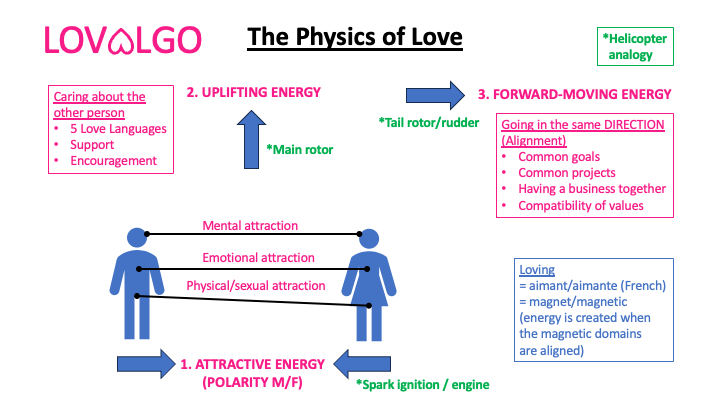The Science Behind Lovalgo
Magnetic Domains
Because we want energizing relationships, the first thing to understand is how energy is created. Energy is created when the magnetic domains in a metal point in the same DIRECTION.

Esquema de dominios magnéticos de un ferromagneto alineándose con un campo creciente. Preparada por Jose Lloret y Alicia Forment, y liberada bajo la GFDL (source : Wikipedia.com).
A wonderful book that describes magnetic domains and how they apply to modern technology is "Driving Force – The Natural Magic of Magnets" by James D. Livingston.
The Physics of Love
Our research has identified three main components of successful long-term romantic relationships.
If we think in terms of energy, we see that a romantic relationship has the following energies:
- Attractive energy
- Uplifting energy
- Forward-moving energy

The diagram is fairly self-explaining, especially once you understand the concept of magnetic domains.
In romantic relationships, the attractive energy is when masculine energy is attracted to feminine energy, in the same way that a positive pole of a magnet is attracted to a negative pole of a magnet.
And we can be attracted to another individual on various levels (= for different reasons):
- On a spiritual level
- On an intellectual level
- On an emotional level
- On a physical level
A long-term compatibility needs attraction on several of these levels. Ideally, all four.
Next, the uplifting energy. This is where the heart of the LoveAlgo algorithm comes into play.
What makes us feel uplifted in a relationship? Well, there are different things that apply to different people, and for those of you who do not already know about The 5 Love Languages, I suggest you look into the work of Gary Chapman: https://5lovelanguages.com.
So, some people will feel uplifted when they get compliments, others when they receive presents, others when they spend quality time with their partners, others when they are touched physically, and finally others when they receive help through various acts of service.
Now, the research leading to the LoveAlgo algorithm has found that we will also feel more uplifted around people who share specific letters in our names, or numbers in our birth dates.
The logic here is the same as for rhymes and repeated notes in music, and that is why harmonious music feels uplifting. And our goal is to have the same uplifting feelings with a romantic partner as we have with our favourite music!
And why are rhymes uplifting? Well, the same letters all point in the same direction, they are aligned, and as we saw above, energy is created when the magnetic domains in a metal point in the same direction. And our research has come to the conclusion that this is true not only for magnetic domains in metals, but also for letters in names and places, and even for abstract concepts like sharing the same values and goals, 'pointing' in the same direction.
Finally, the forward-moving energy in our diagram describes the importance of two individuals, or a group of people, to have common values and to work on a common goal together.
Ideally, this goal should not be self-serving and should include some kind of service or help to people outside your family or group.
Research References
Two research papers have analyzed individuals' names and confirm the validity of our own research underlying the Lovalgo algorithm:
Pelham BW, Mirenberg MC, Jones JT. Why Susie sells seashells by the seashore: implicit egotism and major life decisions. J Pers Soc Psychol. 2002 Apr; 82(4):469-87. PMID: 11999918.
Read PaperBrett Pelham & Carvallo Mauricio (2015): When Tex and Tess Carpenter Build Houses in Texas: Moderators of Implicit Egotism, Self and Identity, DOI: 10.1080/15298868.2015.1070745
Read PaperMore research like this would be necessary.
Birth Order Research
As for research on birth order, you can check Dr. Kevin Leman's books and work:
http://birthorderguy.com/welcome/
Next to modern research, another factor that points at the importance of birth order is the fact that the Kauna and Barngarla peoples from South Australia used to greet each other like this: "First name – birth order – last name or tribe name". And they had specific words for the ten first birth orders for each gender. So, I would be Henrik Kartamiru Hillerström. And a first-born female would be: "First name – Kartanya – Last name".
Thus, they knew straight away what to expect from each other, as individuals with the same birth order have some common behaviour patterns.
Lovalgo continues its research to finetune its algorithm in upcoming versions.